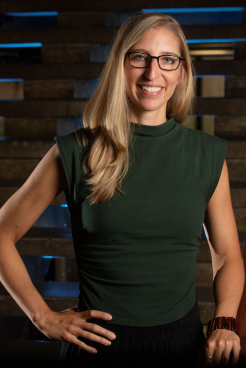Pamela Conrad '06 Master of Landscape Architecture

Pamela Conrad is an internationally recognized landscape architect and climate advocate. Her mission as founder of Climate Positive Design is to positively impact the climate crisis through advocacy, education and design of the exterior built environment. Through the 2019 Landscape Architecture Foundation Fellowship for Innovation and Leadership, she developed the free online Pathfinder landscape carbon app for the Climate Positive Design Challenge.
Growing up on a farm, Conrad started working in landscapes as a young girl.
“Taking care of the environment was second nature to me,” she says. “It just made sense. You take care of the land, and it takes care of you.”
After earning a degree in plant science from the University of Missouri, she attended Cal Poly Pomona’s Master of Landscape Architecture program.
“Cal Poly Pomona set me up for success,” Conrad says. “It increased my relevance and encouraged forward-thinking.”
Her time at Cal Poly Pomona was transformative, and the environmental focus framed her career. Conrad connected deeply with the ethos of John T. Lyle, a landscape architecture professor who founded the Center for Regenerative Studies and was the author of “Regenerative Design for Sustainable Development.”
After completing the 2022-2023 Harvard Loeb Fellowship, Conrad will begin teaching at Harvard’s Graduate School of Design this fall. As an Architecture 2030 Senior Fellow, she strives to find multi-disciplinary ways to reduce greenhouse gas emissions while creating healthier, more equitable communities and biodiverse environments.
“Learning about the climate and biodiversity crisis -- what humans have done to cause it and how we have opportunities to heal our planet -- has left me with a deep sense of responsibility for taking action,” she says.
Her father’s love and connection to nature inspires Conrad’s passion.
“It is what keeps me going and fuels my drive to leave the world better than we found it: to find solutions for a resilient future.”